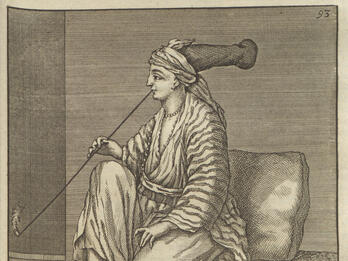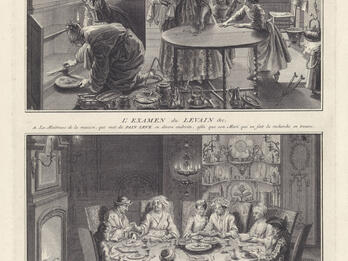Contra la verdad no hay fuerza (The Truth Will Always Win Out)
Daniel Levi de Barrios
1665
Truth descends to the stage in a pillar of fire.
I come to dispel shadows with eternal light.
What difficulties do I see?
What do I see?
Is it not Truth whom I adore?
Is it not Law whom I abhor?
Is it not she whom Moses raised on high, when, for his zeal, preaching to Israel meant preaching in the desert?
Related Guide
Early Modern Jewish Languages
As Ashkenazi and Sephardi Jews migrated eastward, Yiddish and Ladino emerged as distinct languages. Both languages developed literary traditions, as print became more widespread.

Related Guide
Early Modern Literature and the Arts
Jewish literary creativity flourished in the early modern period, dominated by Hebrew poetry that blended religious themes with Renaissance forms.
Creator Bio
Daniel Levi de Barrios
A poet and playwright, Daniel Levi (Miguel) de Barrios was considered the greatest poet among Western Sephardic Jews. He was born in Montilla, Andalucía, to a family of New Christians. In the 1650s, he returned to Judaism in Livorno. For some time, however, he lived as a Catholic in Brussels, which was under Spanish rule, and he received the rank of captain in the Spanish army. In 1662, de Barrios settled in Amsterdam but occasionally traveled to Brussels, despite the prohibition imposed by the Sephardic Jewish community. He also became a follower of Shabbetai Tzvi. Some of de Barrios’s books were published in Brussels under the name Miguel Barrios, his Christian name, to the dismay of the syndics of the Amsterdam Jewish community. His poetry was influenced by the Spanish Baroque style. Among his writings are historical works about the Sephardic community of Amsterdam, with attention to its personalities and institutions.
You may also like
Asire ha-tikvah (Prisoners of Hope)
Jonen dalim (He That Has Mercy on the Poor)
Comedia de Amán y Mordochay (Comedy of Haman and Mordechai)
La Comedia famosa dos sucessos de Jahacob e Essau (Renowned Comedy of the Exploits of Jacob and Esau)
La-yesharim tehilah (Praise for the Upright)



